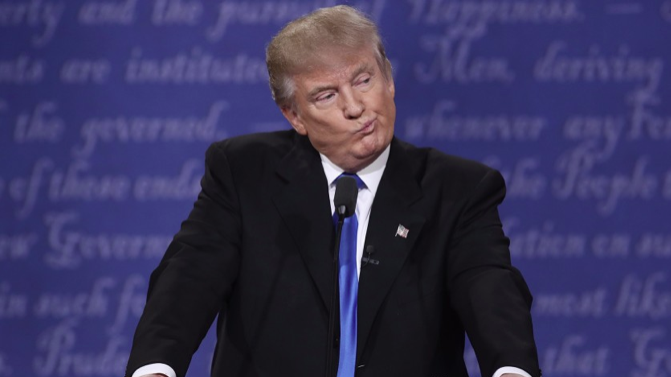CommentsGELFAND’S WORLD--Remember when conservative politicians wrapped themselves in the anti-crime image, complaining to the public about how robbers and murderers were getting off on technicalities?
The Jack Webb television shows even made it a joke when Sgt Friday read criminals their rights, as if this were some sort of liberal plot to overthrow the American system of justice. Somehow the system survived, and we treat evidentiary issues as something to be respected. In practice, most criminal indictments result in convictions or guilty pleas.
But one man got off scot free on a technicality this weekend, even though he was trying to overthrow our Constitutional system.
It was of course our immediately former president, Donald J. Trump, who got off. It took a whole lot of twisting and squirming among some lawmakers for this to happen -- Republican senators had to invent a whole new Constitutional right -- that technicality -- so that they could then vote to acquit.
You've probably already heard all about it, or even saw it happen. The plus side is that 57 senators, well beyond a simple majority, voted to convict, and a mere 43 voted not guilty. As we shall see, even among those 43 there were those who admitted that they voted to acquit only because of that legal technicality.
That new "Constitutional right" -- and really a phony technicality -- was ostensibly that the Constitution does not provide for the impeachment of a former president who is no longer in office. The fact that Donald Trump was impeached while he was in office was ignored.
So there it was, a technicality that was invented solely for the purposes of incumbent Republican senators who didn't want to anger their own voters.
The importance of the impeachment vote was significant, because the former president could have been barred from ever running for office again -- something he has talked about doing.
But there is much more to it. It would have been possible for the U.S. Senate to establish an official finding for all time that presidents should not create insurrections against the United States government. In failing to do so, the Republicans (the 43 out of 50 of them) have significantly weakened the authority of the congress.
On Saturday morning, we saw a vote that was reminiscent of the OJ trial. You remember -- "If it doesn't fit, you must acquit," as if this were a logical and coherent argument on the facts. "If he's no longer in office, you must" . . . sorry, I can't figure out anything that rhymes here, but you get the point. And Trump's narrow acquittal -- it was the most votes to convict a president in the history of the United States -- was just as logical as the votes to acquit OJ of murder.
Still, even a lot of Republicans couldn't quite stomach the idea of exonerating the president, and they made sure to sound out that point clearly and decisively.
Mitch McConnell first voted Not Guilty, and only a few minutes later, stood at the lectern and pronounced Trump guilty.
"Former President Trump’s actions preceding the riot were a disgraceful, disgraceful dereliction of duty." McConnell added that Trump is “practically and morally responsible for provoking the events of the day, no question about it.”
Guilty as charged, your honor.
In essence, McConnell pronounced Trump guilty out of one side of his mouth, but made clear that he had voted Not Guilty out of political expediency. He was careful not to say that, but the reality was clear.
Mr. Smith Goes to Washington this wasn't.
And McConnell wasn't the only Republican senator to manage this exercise in tightrope walking and hair-splitting all at once. But that's what you've got to do if you got elected by Trump supporters -- people who would break down your office doors if you showed anything less than total loyalty -- but you are also trying to protect some tiny part of looking marginally sane before the world. By Monday morning, the Republican Party of North Carolina was already trying to censure Sen. Richard Burr for his somewhat heroic vote.
There were 7 Republicans in the senate who didn't fall down prostrate to Trump's perceived political power. They were Burr, Cassidy, Collins, Murkowski, Romney, Sasse, and Toomey of (respectively) North Carolina, Louisiana, Maine, Alaska, Utah, Nebraska, and Pennsylvania.
As has been mentioned, two of them had already announced that they will not be running for reelection.
The Trump Legacy
Presidents are remembered for various things.
The only thing we have to fear is fear itself.
Ask not what your country can do for you: ask what you can do for your country.
Mr. Gorbachev, tear down this wall.
Donald Trump has established a legacy for himself and his presidency, and no matter how much he may try to fight it, he can never escape that legacy. It is now and forever the image of the angry mob assaulting the capitol building. It's doubly pathetic because the image isn't even of him. Consider honest Abe signing the Emancipation Proclamation or Washington crossing the Delaware -- they are in those pictures doing heroic acts which changed history. It's likely that Trump's presidency will eventually be remembered by historians as merely a tiny dot in the wider picture, soon to be undone by the newly elected administration.
And what of those Republicans who still are falling for the Big Lie that millions of votes were siphoned off of Trump's totals? In the future, the GOP, once the Grand Old Party, may be better remembered as the Gullible Old Party.
(Bob Gelfand writes on science, culture, and politics for CityWatch. He can be reached at [email protected])
-cw
















